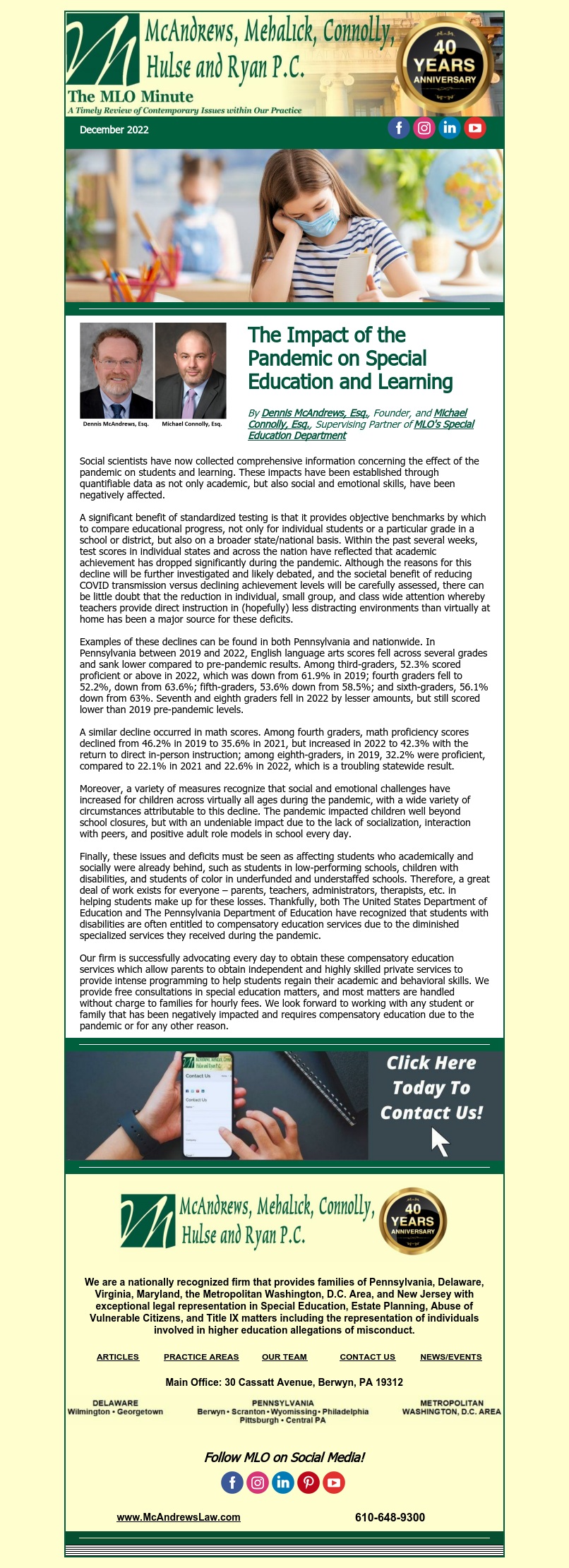December 2022:
The MLO Minute: “The Impact of the Pandemic on Special Education and Learning” —
By Dennis McAndrews, Esq., Founder, and Michael Connolly, Esq., Supervising Partner of MLO’s Special Education Department —
Social scientists have now collected comprehensive information concerning the effect of the pandemic on students and learning. These impacts have been established through quantifiable data as not only academic, but also social and emotional skills, have been negatively affected.
A significant benefit of standardized testing is that it provides objective benchmarks by which to compare educational progress, not only for individual students or a particular grade in a school or district, but also on a broader state/national basis. Within the past several weeks, test scores in individual states and across the nation have reflected that academic achievement has dropped significantly during the pandemic. Although the reasons for this decline will be further investigated and likely debated, and the societal benefit of reducing COVID transmission versus declining achievement levels will be carefully assessed, there can be little doubt that the reduction in individual, small group, and class wide attention whereby teachers provide direct instruction in (hopefully) less distracting environments than virtually at home has been a major source for these deficits.
Examples of these declines can be found in both Pennsylvania and nationwide. In Pennsylvania between 2019 and 2022, English language arts scores fell across several grades and sank lower compared to pre-pandemic results. Among third-graders, 52.3% scored proficient or above in 2022, which was down from 61.9% in 2019; fourth graders fell to 52.2%, down from 63.6%; fifth-graders, 53.6% down from 58.5%; and sixth-graders, 56.1% down from 63%. Seventh and eighth graders fell in 2022 by lesser amounts, but still scored lower than 2019 pre-pandemic levels.
A similar decline occurred in math scores. Among fourth graders, math proficiency scores declined from 46.2% in 2019 to 35.6% in 2021, but increased in 2022 to 42.3% with the return to direct in-person instruction; among eighth-graders, in 2019, 32.2% were proficient, compared to 22.1% in 2021 and 22.6% in 2022, which is a troubling statewide result.
Moreover, a variety of measures recognize that social and emotional challenges have increased for children across virtually all ages during the pandemic, with a wide variety of circumstances attributable to this decline. The pandemic impacted children well beyond school closures, but with an undeniable impact due to the lack of socialization, interaction with peers, and positive adult role models in school every day.
Finally, these issues and deficits must be seen as affecting students who academically and socially were already behind, such as students in low-performing schools, children with disabilities, and students of color in underfunded and understaffed schools. Therefore, a great deal of work exists for everyone – parents, teachers, administrators, therapists, etc. in helping students make up for these losses. Thankfully, both The United States Department of Education and The Pennsylvania Department of Education have recognized that students with disabilities are often entitled to compensatory education services due to the diminished specialized services they received during the pandemic.
Our firm is successfully advocating every day to obtain these compensatory education services which allow parents to obtain independent and highly skilled private services to provide intense programming to help students regain their academic and behavioral skills. We provide free consultations in special education matters, and most matters are handled without charge to families for hourly fees. We look forward to working with any student or family that has been negatively impacted and requires compensatory education due to the pandemic or for any other reason.





